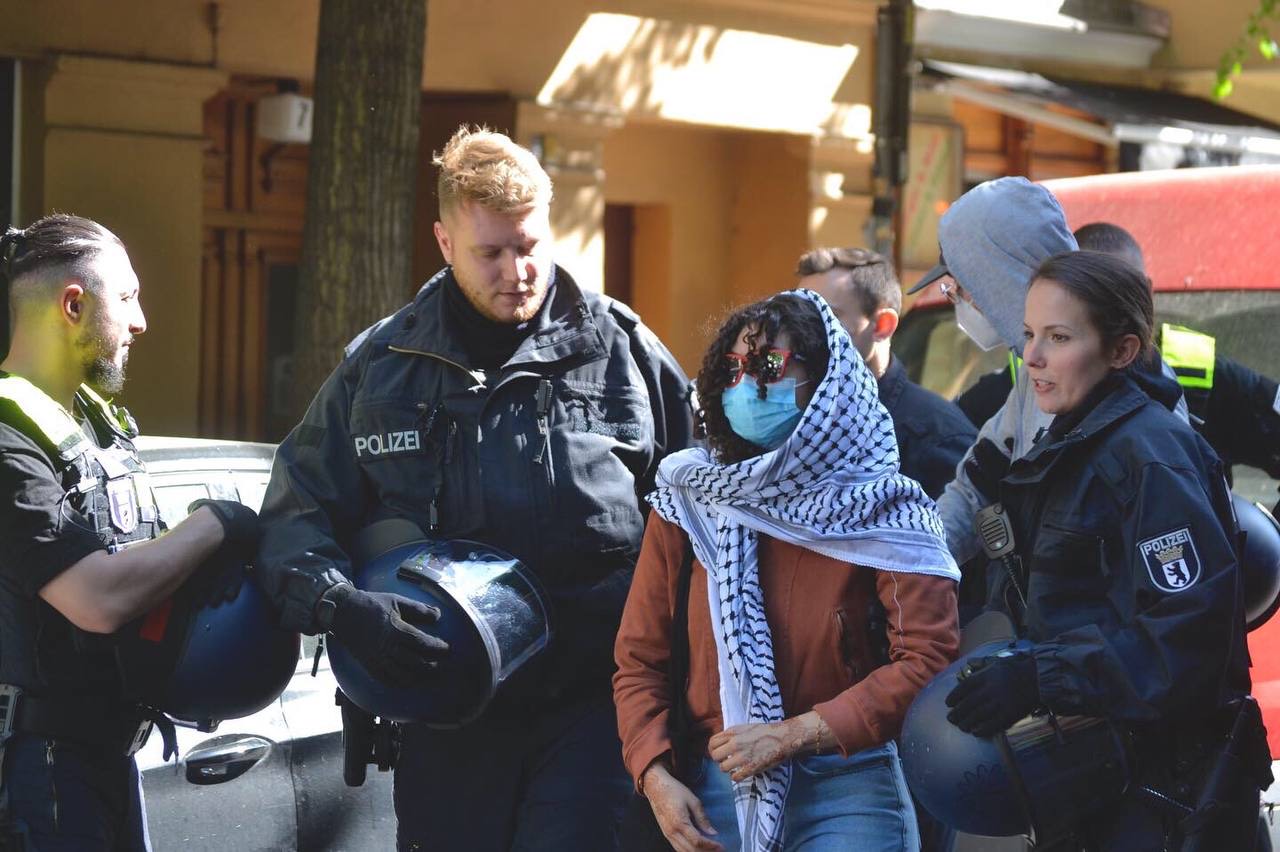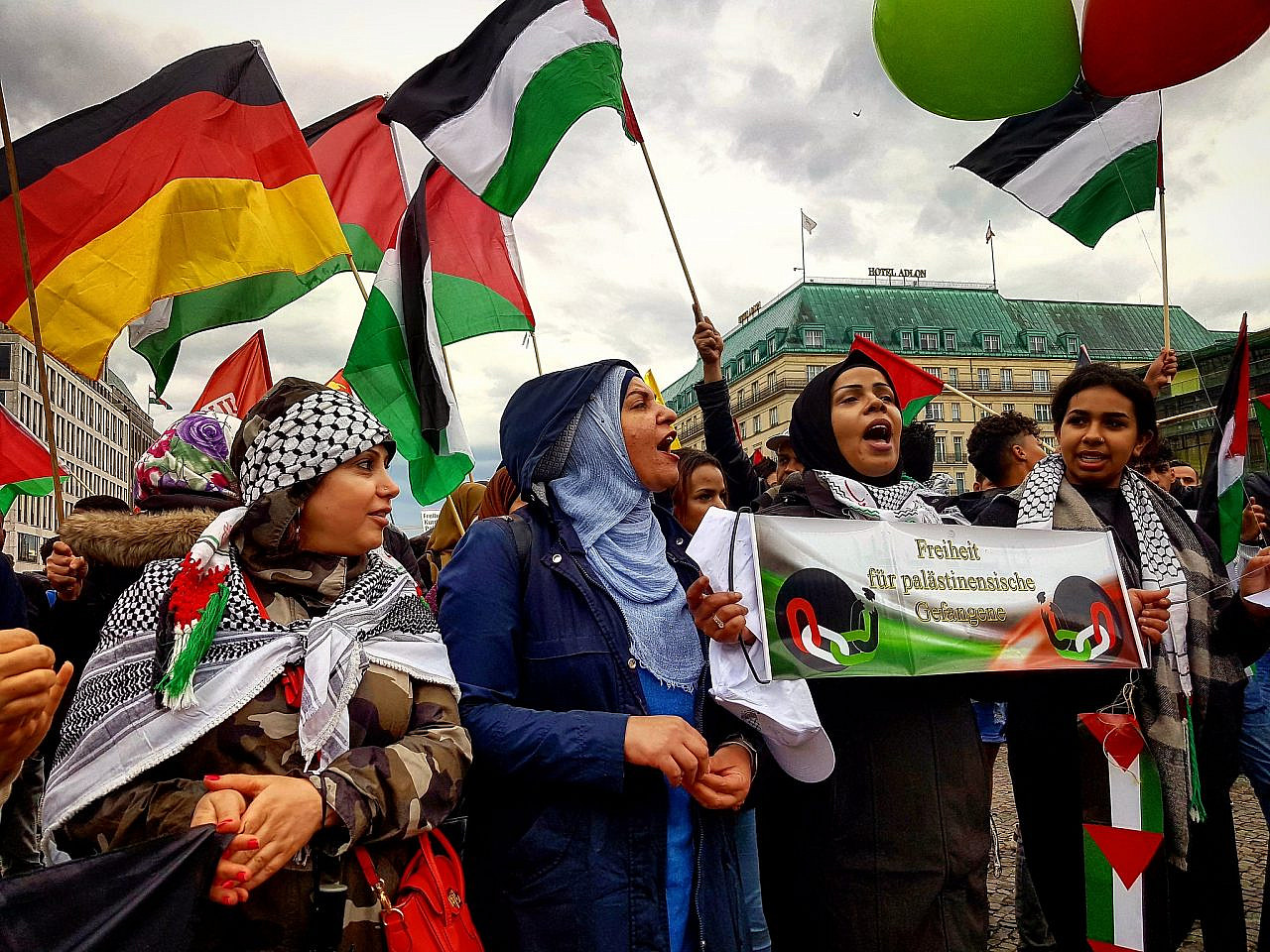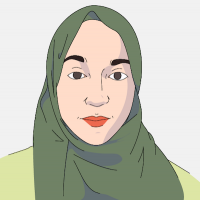In May 2022, days before Palestinians around the world marked the 74th anniversary of the Nakba, Berlin police issued a blanket ban on all protests and events slated to take place in the city that coming weekend, deeming them “potentially antisemitic.” By the end of the day of Nakba commemorations, the city’s police had detained over 170 protestors and bystanders who came out to mark the ethnic cleansing of 750,000 Palestinians from their homeland in 1948, in addition to the recent murder of Palestinian journalist Shireen Abu Akleh by Israeli forces.
Only last month, police admitted to having arrested individuals simply for wearing the colors of the Palestinian flag, even if they were not taking part in a demonstration.
Now, the Berlin police have once again outlawed two demonstrations advocating for Palestinian political prisoners, organized earlier this month by the prisoner solidarity organization Samidoun. The police’s statement claimed that there was “imminent danger” that the gatherings would lead to “inflammatory antisemitic exclamations” and a “glorification of violence.”
Pro-Palestinian advocates and those critical of Israeli policies argue that the ban is a clear violation of the right to assembly and the most recent example of anti-Palestinian racism in Germany.
“[T]he German state — through the Berlin police — is attacking the over 4,800 Palestinians imprisoned by the Zionist occupation and [who] are struggling for justice and liberation by targeting Palestinian Prisoners’ Day for repression and silencing,” Samidoun said in a statement. “We commemorate Palestinian Prisoners’ Day annually on 17 April to stand with those Palestinians at the core of our cause and the center of our resistance, the Palestinian prisoners locked behind bars by the colonial occupation.”

“They are attempting the same violations of our freedoms as last year,” Zaid, a representative of Samidoun who asked to be referred to only by his first name, told +972. He believes that the ban comes in response to “political pundits and news media who are ‘concerned’ about our protests that commemorate political prisoners or the exile of the hundreds of thousands of Palestinians during the Nakba.”
The police gave as a pretext an antisemitic incident at a recent pro-Palestine protest, where one unidentified demonstrator among hundreds present chanted “death to Jews.”
But the German based solidarity campaign #nakba75, which aims to raise awareness of the Palestinian struggle and the Nakba 75 years on, tells +972 that these bans are rooted in anti-Palestinian and anti-Muslim racism. “According to their logic, any anti-racist demonstration would have to be banned if one person shouted something racist. Those pundits now calling for all pro-Palestine demonstrations to be banned have never done so when actual German fascists demonstrate with their antisemitic and anti-Muslim slogans.”
On April 14, the administrative court in Berlin upheld the ban, in effect reinforcing a pro-Israel narrative. According to the court judgment, the police justified the ban by stating that the registered protest posed “a direct danger to the right to life and physical integrity” and featured “highly anti-Israel and antisemitic sentiment.” The police also referred to the fact that Samidoun describes “‘Israeli apartheid’ against the Palestinians as a ‘crime against humanity’” — a reality documented by numerous NGOs, including Amnesty International.
Safaa Moussa, junior legal officer at the European Legal Support Center, which defends advocates for Palestinian rights, tells +972 that the bans issued this year and last offer a dangerous prognosis. “The bans were justified based on a general criminalization of certain groups of people and putting them under suspicion based on their ethnicity, nationality, religion and political views,” she explains. “It is not only a further curtailment of fundamental rights, but also an intensification of the so-called ‘chilling effect’: the more bans and restrictions are enforced, the more society as a whole is deterred and adapts its actions according to fears of sanction by the state.”
Taking this precedent forward, the criminalization of Palestinian speech or right to protest is already underway in other German cities. On April 15, Cologne police broke up a demonstration marking Palestinian Prisoners’ Day and opened an investigation against the Palestinian organizers involved — one of whom also happens to be a Samidoun member. “We know about what is happening in Berlin and let this knowledge flow into our operational planning,” police spokesman Philipp Hüwe said.

These measures to restrict the freedoms of Palestinians go even further. In a recent interview, the secretary-general of the German Democratic Party, Bijan Djir-Sarai, called for the naturalization test for obtaining German citizenship to be extended in order to assess “hateful attitude[s] towards Jews,” which, by his own account, includes anti-Israel sentiment.
“This isn’t just about Samidoun but about all Palestinians who want to speak up about their struggle,” said Zaid. “It does not matter which angle you take in your fight — whether you focus on the humanitarian angle, advocate for children, or protest, everything related to Palestine in Germany will be slandered and called antisemitic.”
Since the adoption of the IHRA definition of antisemitism and the categorization of BDS as antisemitic by the Bundestag, anti-Palestinian repression in Germany has escalated to an all-time high. In the name of fighting antisemitism, Palestinians have been denied the right to express themselves and exist as a community in public spaces. Yet it is also clear the government is not speaking on behalf of all Jewish people in Germany.
In an open letter published earlier this month, Jewish and Israeli Berliners state that the bans do not protect them — justice and solidarity do. “We Jews and Israelis living in Berlin wish to express our opposition to the ban on all Palestinian demonstrations in the city last weekend and similar calls to ban future demonstrations,” the statement reads. “We regard this blanket ban based on speculation over potential unlawful acts as discriminatory against the Palestinian minority in Germany and a worrying precedent that will inevitably affect other marginalized communities. Such anti-democratic measures amount to collective punishment and do not offer us real protection as Jewish Berliners.”
Organizers planning Nakba commemorations in May, such as those at #nakba75, are alarmed.
“For us at the #nakba75 campaign we expect that the German state will try to once again ban all demonstrations, rallies, and commemoration of the Nakba in May this year as well, like they did last year in Berlin. We do not accept these anti-democratic bans that restrict the right to assembly and the freedom of speech. These are basic democratic rights. When they are taken away, as is currently the case for pro-Palestinian demonstrations, everyone should be alarmed.”
Yet Zaid believes this latest flare-up of anti-Palestinian racism is just a reaction to the increasing support for Palestine in Germany. “More and more Palestinians who were silent before are speaking up now about their situation and demanding justice, especially refugees,” he said. “When they hear our call demanding freedom from the river to the sea, and supporting Palestinian resistance against a violent occupier in all its forms, they only feel empowered. No amount of German repression will subdue the growing movement.”


